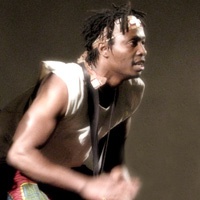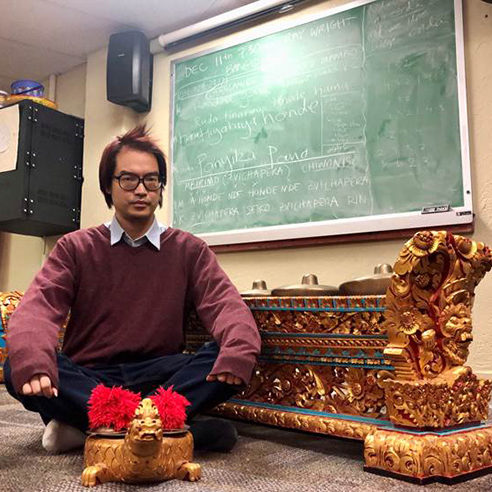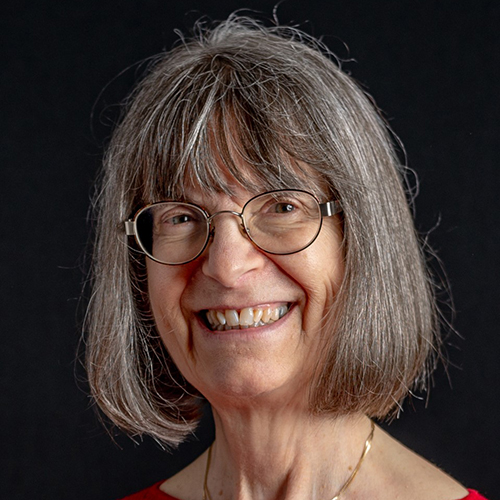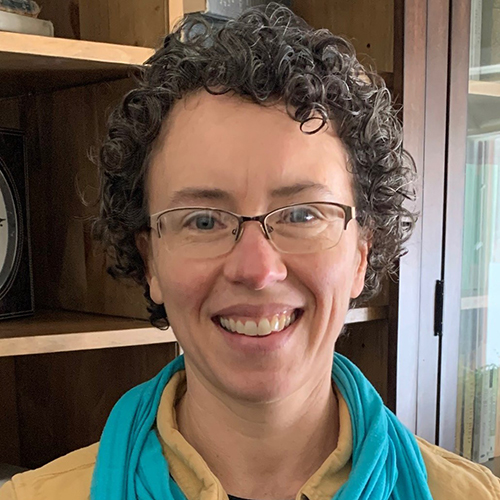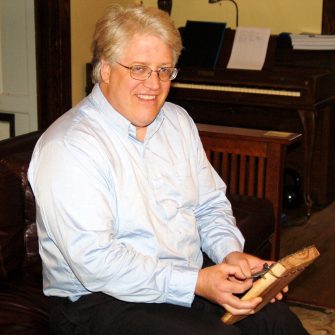Michael Alan Anderson
Professor of Musicology
Faculty Associate, Susan B. Anthony Institute
Faculty Affiliate, Humanities Center, University of Rochester
Founder and Program Director, ENCORE Chorus
BIOGRAPHY
Michael Alan Anderson is an award-winning scholar and performer whose work spans musical traditions to community wellbeing. He specializes in sacred music from the fourteenth through sixteenth centuries, illuminating the intersections of devotion, art, and social identity in the late Middle Ages and Renaissance. He is the author of Music and Performance in the Book of Hours (Routledge Press, 2022) and St. Anne in Renaissance Music: Devotion and Politics (Cambridge University Press, 2014). Anderson’s articles have appeared in various peer-reviewed journals, and he is a two-time winner of ASCAP’s Deems Taylor Award for outstanding writing about music, for articles published in Early Music History (2011) and in the Journal of the American Musicological Society (2013).
His publications have been subvented by the Martin Picker Endowment, Claire and Barry Brook Fund, and the Margarita M. Hanson Fund of the AMS (supported in part by the National Endowment for the Humanities and the Andrew W. Mellon Foundation); the Newberry Weiss-Brown Publication Award; and professional development funding from the Eastman School of Music. He is also the 2012 winner of the Noah Greenberg Award, given by the American Musicological Society for outstanding contributions to historical performance practices. Other academic awards include the National Endowment for the Humanities Summer Stipend, the Alvin H. Johnson American Musicological Society 50 Dissertation-Year Fellowship, and the Grace Frank Grant (Medieval Academy of America). In 2017 and 2023, Anderson received Humanities Project grants from the University of Rochester, which allowed for a symposium on machine-reading of medieval music manuscripts and a musical complement to the Memorial Art Gallery’s exhibit on stained glass, respectively. He further received the University of Rochester’s Provost Multidisciplinary Award in 2013, which involved producing first recordings of medieval music supplied to the newly installed medieval gallery at the Memorial Art Gallery.
Anderson’s academic profile includes editorial work with two textbooks published by W.W. Norton (The History of Western Music, ed. Burkholder and Concise History of Western Music, ed. Hanning). He also sat on the editorial board of the American Choral Review, the semiannual journal of the organization Chorus America. Papers have been presented nationally and internationally at conferences both inside and outside his primary field. In 2015, he saluted his alma mater by publishing The Singing Irish: A History of the Notre Dame Glee Club (University of Notre Dame Press), which chronicles the history of one of the oldest American choruses on the occasion of its centennial.
Committed to bringing historical sources of music to audible reality, Anderson has served as artistic director of Chicago-based professional early music ensemble Schola Antiqua since 2008. Specializing in the performance of medieval plainchant and Renaissance polyphony, the group maintains an artistic residency at the Lumen Christi Institute in Chicago. Collaborations with the Metropolitan Museum of Art in New York and other museums around the country have defined his tenure with Schola Antiqua. For these partnerships inspired by visual art, Chorus America awarded him the 2016 Louis Botto Award for Innovative Action and Entrepreneurial Zeal. Schola Antiqua’s albums have been released on the Naxos and Discantus labels, and the ensemble has recorded music for academic publications, including Margot Fassler’s Music in the Medieval West (W.W. Norton, 2014). Music from Schola Antiqua’s commercial albums has aired regularly on the nationally syndicated broadcasts of With Heart and Voice, Millennium of Music, and Harmonia and has been widely reviewed. Culture Catch named the group’s 2014 recording Missa Conceptio tua (Naxos) one of the year’s best classical albums of that year. BBC Music Magazine placed the Schola Antiqua’s “Tidings True” concerts among the top 20 recommended music performances in the United States for December 2012, and the ensemble was nominated for “Best Classical Group” of 2020 by the Chicago Reader.
As managing editor of the Eastman Case Studies series, Anderson wrote more than 20 case studies and oversaw the publication of 10 volumes of essays shaping dialogue around leadership and ethics in today’s global musical arts. The University of Rochester awarded him a Bridging Fellowship in 2019 for study in the Simon School of Business to enhance his work with the case studies series. A case study Anderson published involving The Phoenix Symphony’s participation in clinical research with Alzheimer’s patients led to his founding of the ENCORE Chorus for people living with dementia, their care partners, and an intergenerational team of volunteers.
Hosted by the Eastman Community Music School, the ENCORE Chorus exemplifies Anderson’s belief in music as a force for human dignity and healing. The group provides a structured musical intervention and social experience for a vulnerable population that benefits from a nonpharmacological, arts-first approach to a devastating neurological disease. Beyond a traditional rehearsal environment, ENCORE includes guided improvisation, storytelling, and light movement, enriching participants’ engagement and expressive opportunities. The program is supported by the University of Rochester Aging Institute, the School of Nursing, the Department of Psychiatry Division of Geriatric Mental Health and Memory Care, the Department of Health Humanities and Bioethics, and the Eastman Performing Arts Medicine Center. As program director of the ENCORE Chorus, Anderson supervises the overall experience for participants, recruits for the organization, and pursues research and grant prospects. He now serves on the National Advisory Council of the Giving Voice Initiative, which provides a model for the ENCORE Chorus experience.
WORKS AND PUBLICATIONS
Books
Music and Performance in the Book of Hours. Routledge Press, 2022. (Introduction and Chapter 2 available through Open Access)
- Winner of the Newberry Weiss-Brown Publication Subvention (2021), which subsidizes the publication of a scholarly book on European civilization before 1700 in the areas of music, theater, cultural studies, or French or Italian literature. (April 2021)
- Subvention award from the Claire and Barry Brook Fund and Margarita M. Hanson Fund of the American Musicological Society, supported in part by the National Endowment for the Humanities and the Andrew W. Mellon Foundation. (July 2022)
- Multiple grants in support of the publication from the Eastman School of Music, Professional Development Funds (February, May 2022)
St. Anne in Renaissance Music: Devotion and Politics. Cambridge University Press, 2014. Chapter 1 – sample • Review in Speculum • Review in Plainsong & Medieval Music • Review in Music & Letters • Review from Renaissance Quarterly • Review in Notes • Appendix B and Errata
- Publication subvention from the Martin Picker Endowment of the American Musicological Society, funded in part by the National Endowment for the Humanities and the Andrew W. Mellon Foundation. (December 2013)
- Subventions from the University of Rochester, Office of the Provost (July 2013) and the Eastman School of Music, Professional Development Funds (June 2013)
The Singing Irish: A History of the Notre Dame Glee Club. University of Notre Dame Press, 2015. Chapter 4 – sample
Articles
“The One Who Comes After Me: John the Baptist, Christian Time, and Symbolic Musical Techniques,” Journal of the American Musicological Society 66 (2013): 639-708. Full text
“Cantus Firmus,” in Oxford Bibliographies in Music. Ed. Kate van Orden. New York: Oxford University Press, 2019 with co-author: C. Aaron James
“The Palatini Partbooks Revisited,” Journal of the Alamire Foundation (2019), 85-96.
“Root, Branch, and Flower: Lineage and Fecundity in the Versified Offices for St. Anne,” in The Book of Nature and Humanity in Medieval and Early Modern Europe, ed. David Hawkes and Richard G. Newhauser, Arizona Studies in the Middle Ages and the Renaissance 29 (Turnhout: Brepols, 2013), 105-129.
“Fire, Foliage, and Fury: Vestiges of Midsummer Ritual in Motets for John the Baptist,” Early Music History 30 (2011): 1-54. Full text
“‘His Name will be Called John’: Reception and Symbolism in Obrecht’s Missa de Sancto Johanne Baptista,” Early Music 39 (2011): 547-61. Full text
“Enhancing the Ave Maria in the Ars Antiqua,” Plainsong and Medieval Music 19 (2010): 35-65. Full Text
“Magnificat – Christianity – Medieval Times and Reformation Era,” in the Encyclopedia of the Bible and Its Reception, 30 vols. (Berlin: Walter de Gruyter), vol. 17, forthcoming.
“The Organization and Complexes of the Q 15 Hymn Cycle,” Studi musicali 35 (2006): 327-62.
“Can Music Heal Our National Divisions?” The Washington Post. Op-ed in Perspective: Made by History. June 18, 2019. (link)
“An Interview with New York Polyphony,” American Choral Review 58 (2020): 20-24, with co-author Laura Lynch.
Reviews
Review of Medieval Music, Legend, and the Cult of St. Martin: Local Foundations of a Universal Saint, by Yossi Maurey, in Plainsong & Medieval Music 24 (2015), 234-40.
Review of The Flower of Paradise: Marian Devotion and Secular Song in Medieval and Renaissance Music, by David J. Rothenberg, in Speculum: A Journal of Medieval Studies 89 (2014), 236-7.
Review of Anne Smith, The Performance of 16th-Century Music: Listening to the Theorists. Oxford University Press, 2011, in American Choral Review 55 (2013): 12-13. Full text
Review of Christopher Page, The Christian West and its Singers: The First Thousand Years. New Haven: Yale University Press, 2009, in American Choral Review 53 (2011): 9-11. Full text
Case Studies
Written for the Eastman Case Studies series (each includes Teaching Notes)
- “Tonality: Unity through Diversity” (Rochester: Institute of Music Leadership, 2021)
- “Gamelan Dharma Swara” (Rochester: Institute of Music Leadership, 2021)
- “Bridging Cultures with the South Dakota Symphony” (Rochester: Institute of Music Leadership, 2020)
- “Fifth House Ensemble and Agent Relationships” (Rochester: Institute of Music Leadership, 2020)
- “The Nashville Symphony” (Rochester: Institute of Music Leadership, 2020)
- “Bridging the Gap: Accountability at the San Francisco Symphony” (Rochester: Institute of Music Leadership, 2020)
- “The Crossing at a Crossroads” (Rochester: Institute of Music Leadership, 2020)
- “Stress, Science, Saliva, and a Symphony” (Rochester: Institute of Music Leadership, 2019)
- “Refugees and Cultural Humility at Buffalo String Works” (Rochester: Institute of Music Leadership, 2019)
- “Chanticleer, Youth, and the Choral Art” (Rochester: Institute of Music Leadership, 2019)
- “Lara Downes: Artist, Activist” (Rochester: Institute of Music Leadership, 2019)
- “Kinnara Ensemble: A Project-Based Choir” (Rochester: Institute of Music Leadership, 2019)
- “Name Calling: The Rebranding of Artis–Naples” (Rochester: Institute of Music Leadership, 2018)
- “Succession Planning at Art of Elan” (Rochester: Institute of Music Leadership, 2018)
- “The Sphinx Organization and the Diversity Marketplace” (Rochester: Institute of Music Leadership, 2018)
- “Composer Marc Mellits” (Rochester: Institute of Music Leadership, 2018)
- “After Monetization: The New Recording Landscape for Artists” (Rochester: Institute of Music Leadership, 2017)
- “My House is Your House: Groupmuse’s Revival of Chamber Music” (Rochester: Institute of Music Leadership, 2017)
- “Building on Trust at the New World Symphony” (Rochester: Institute of Music Leadership, 2017)
- “No Place Like Home: The Industry at a Crossroads” (Rochester: Institute of Music Leadership, 2017)
- “Taking up Residence with Eighth Blackbird” (Rochester: Institute of Music Leadership, 2016)
- “At the Core: Contract Negotiations at the Hartford Symphony Orchestra” (Rochester: Institute of Music Leadership, 2016)
Recordings with Schola Antiqua
- Notker Balbulus: Liber ymnorum (Naxos of America, 2025), Artistic Director (reviews)
- Missa Conceptio tua: Medieval and Renaissance Music for Advent. Includes the first recording of Pierre de la Rue’s Missa Conceptio tua. (Naxos of America, 2014), Artistic Director and liner notes (reviews)
- The Kings of Tharsis: Medieval and Renaissance Music for Epiphany (Discantus Recordings, October 2011); includes first recordings of works by Leonin, Du Fay, Victoria, and Guerrero. Artistic Director and liner notes.
- West Meets East: Sacred Music of the Torino Codex (Discantus Recordings, October 2010); includes first recordings of music from the first three fascicles of this important fifteenth-century manuscript. Artistic Director and liner notes.
- Long Joy Brief Languor (Discantus Recordings, May 2009); features the only known recording of one of the earliest English cyclic masses Missa Quem malignus spiritus. Performer; liner notes.



